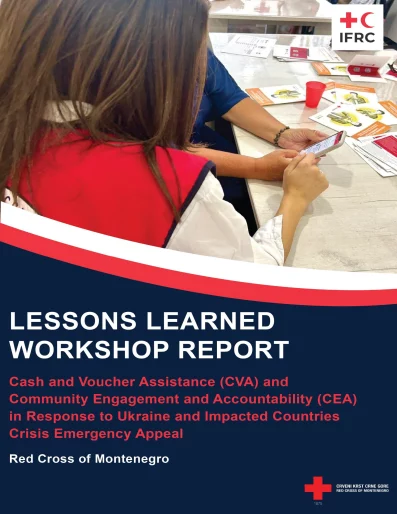Lessons Learned Workshop Report: Cash and Voucher Assistance (CVA) and Community Engagement and Accountability (CEA) in Response to Ukraine and Impacted Countries Crisis Emergency Appeal
Since the escalation of the conflict in Ukraine at the end of February 2022, approximately one-third of people from Ukraine have been displaced, leading to one of the largest displacement crises in the world. From the period of 24 February 2022 until 20 November 2023, 182,047 displaced people from Ukraine entered Montenegro and 10,069 people applied for temporary protection.
To meet the needs of displaced people from Ukraine, the Red Cross of Montenegro (the RCM) in cooperation with the International Federation of Red Cross and Red Crescent Societies (IFRC) is providing assistance to those in need from Ukraine residing in Montenegro, particularly in the sectors of basic needs, seasonal assistance for winters, health care, mental health and psychosocial support and protection, gender and inclusion.
Based on the results of the multi-sectoral needs assessment conducted by the RCM at the beginning of 2023, it was evident that the needs of displaced people from Ukraine differed widely. The most effective solution to address to their needs was identified to be the provision of Multipurpose Cash (MPC) which is in alignment with the IFRC’s strategy for the Ukraine crisis. This strategy emphasizes Cash and Voucher Assistance (CVA) as the preferred modality for providing immediate assistance to meet basic needs and supporting sectoral outcomes in shelter and livelihoods in the short, mid, and long term. The focus is on vulnerable groups, including women with children, pregnant women, single parents, and older individuals, especially those with health issues or traveling alone.
With the support of the IFRC, the RCM piloted a Multipurpose Cash (MPC) through post office in March 2023. Cash assistance was provided to 281 families, reaching a total of 670 individuals. The program was designed to test this modality and assess the capacities of financial service providers. Results from Post-Distribution Monitoring (PDM) showed that beneficiaries were highly satisfied with this kind of assistance and expressed their desire to continue receiving financial assistance.
Following this pilot project to enhance preparedness and enable quick and efficient crisis response, the RCM signed a Framework Agreement with the Post of Montenegro as financial service provider. The Agreement is initially set for one year with the possibility of extension. This Agreement has been legally approved by the IFRC, enabling direct disbursement of assistance in the amount of CHF 2,000,000 without additional procedures for selecting a financial provider. Utilizing this Agreement, the RCM, as part of the IFRC’s Emergency Appeal, implemented the pilot project for sectoral cash, specifically cash for education for school-aged children in Montenegro. The program involved disbursement in two parts, providing support for 256 children through this initiative. This program also included 20% of the local population aiming to foster harmony and understanding between the local community and the target group.
As part of the Ukraine and impacted countries crisis Emergency Appeal, the RCM initiated a financial support program through self-registration, known as AccessRC. This program enables the provision of financial assistance to 3,000 of the most vulnerable individuals through a self-enrolment approach. Apart from this approach, the RCM provided direct assistance to people in need to ensure that everyone is included and supported. As a result, the project has achieved notable success. In the first round of disbursements, assistance was provided to 1,337 individuals from Ukraine who met the qualifications. Since the beginning of the pilot project, the RCM provided support to a total of 2,225 individuals with the amount of EUR 209,130.
In response to the evolving needs of beneficiaries, the RCM implemented a comprehensive approach to enhance good communication and transparency during its cash assistance interventions. Various communication channels, including website, social media, Viber, Telegram, informational material, face-to-face information sharing were employed to ensure transparency and prevent the spread of misinformation. Local branches served as Humanitarian Service Points (HSP), providing information and handling questions and complaints. Key staff of the RCM maintained regular contact with beneficiaries to ensure effective implementation as well as monitoring and Post-Distribution Monitoring (PDM). Additionally, the RCM established the first free Call Centre for Ukrainians in Montenegro, which provides information about rights, temporary protection, education, the health system and activities and services of the RCM, including financial interventions. All information is available in three languages: Ukrainian, English and Montenegrin.



